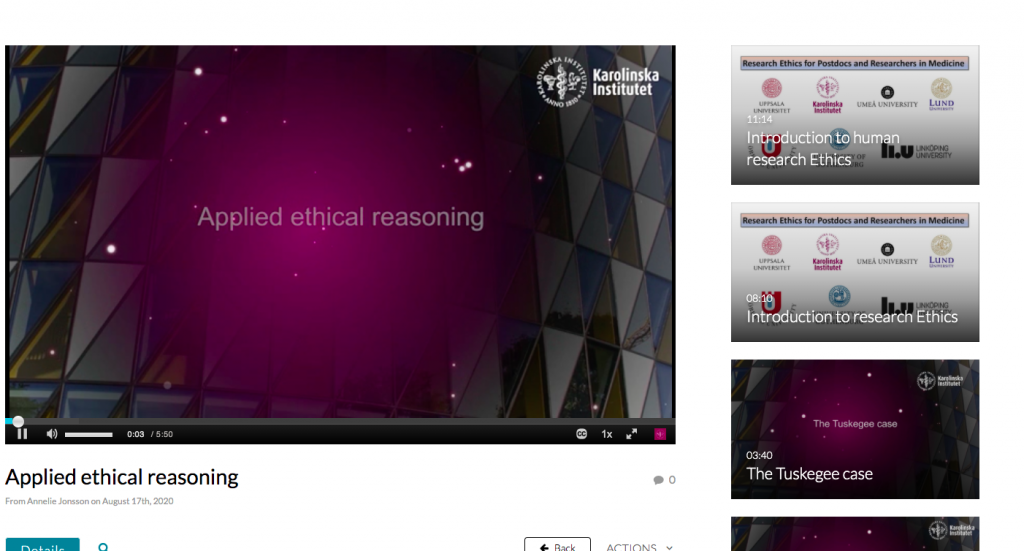
Philosophy of science and research ethics: a course review
Hej folks! This is officially the last course review of the Health Economics, Policy and Management programme at Karolinska Institutet. I can’t believe time passed by so quickly, but certainly we have managed to enjoy and learn from each course. This last review is about philosophy of science and research ethics, which is strategically placed as our last course since it prepares us for our thesis projects.
This course was visibly divided in two modules/sections: (1) Philosophy of Science and (2) Research ethics.
Philosophy of Science:
Design:
Philosophy of science was the most extensive part of the course. It consisted of daily sessions on Zoom in which the professor followed a pre-established structure:
- First a lecture of one of the philosophy topics,
- We were then divided into breakout rooms to discuss and answer together some questions on a specific case.
- Finally, we all went back to the main digital room to discuss with the whole class the different answers to the case questions, as well as for clarifying concepts with the professor.
Content:
The course covered the basic concepts of philosophy of science first as a base for more in depth discussions at the end. The content covered relevant philosophical topics relevant to science and research, including:
- Scientific argumentation
- Induction, deduction and hypothetico-deductive method
- Realism, relativism, instrumentalism
- Scientific paradigms
- Positivism and falsification
- Causality and correlation
- Methodological collectivism and individualism
Staff:
Our instructor for this part of the course was Prof Niklas Juth, who is a renowned researcher in the field of medical ethics.
Schedule:
This first part of the course lasted for 3 weeks. Zoom sessions were held in the afternoons, leaving all morning for reading and individual studies.
Evaluation:
If you have been following my course reviews, you’ll notice very quickly that this course didn’t have a group evaluation. Although we worked in groups constantly throughout the 3 weeks, none of those activities were actually graded. This means that out only formal assessment was the individual assignment, which consisted of a home exam. We were given a pool of questions from which some of them were going to be asked on the exam. This dynamic allowed us to reflect upon and prepare our answers before the exam day, which considering that we were in the middle of a holiday break, was very well received by students.
Research Ethics:
Design:
We changed the dynamics for the second part of the course. Lectures were pre-recorded and posted on our online learning platform for us to watch at any given time. The rest of the non-graded activities consisted of written group discussions using the same platform.

Content
This part of the course covered the main ethical considerations for doing scientific research, specially focused on research involving human subjects. The topics covered were:
- Research on humans and animals
- Ethical principles
- Informed consent and its components
- Ethical guidelines
- Ethical Review
- Good research practice and deviations from good research practice
Teachers
Our course director was Prof Gert Helgesson, a distinguished Swedish researcher in medical ethics.
Schedule
The ethics part of this course lasted 1.5 weeks with a very flexible schedule. The only mandatory sessions were the seminars while the rest of the activities could be done at any given time before the deadline.
Evaluation
This part of the course had two main pass/fail evaluations:
- Seminars: We were tasked with reflecting upon the ethical considerations and possible concerns with our own thesis projects. Feedback from teachers and students was really helpful to frame the ethics section of our thesis project proposal that was due for two weeks later.
- Individual submissions: We were asked to submit two separate dissertations about conflicts of interests and plagiarism. These assignments were quite helpful for understanding the concepts presented on the pre-recorded lectures.
Class insights:
Carla Sacchi (Italy):
What did you like about the course?
I really enjoyed studying all the topics, about philosophy of science and ethics. A very interesting part in philosophy of Science was about argumentation: how can you make your reasoning logically sound? How can you identify wrong argumentations?
Also it was super nice – and a bit unexpected- the fact that the course had a very practical approach. We had the chance to write and discuss a lot with our classmates and professors about the methods and principles we had studied, so it wasn’t just theoretical or “dry” studying but really engaging and fruitful.
How relevant was this course for your future career?
I believe this was one of the most relevant courses. In particular the part about ethics, where they explained the guidelines and recommendations regarding research on humans and animals. It might not seem interesting but it’s actually super important for our master thesis and future research! For example, I’ll be doing interviews for my thesis and the course has been a great help!
That’s a wrap! Thank you all for following the course reviews for the HEPM programme. Do not hesitate to contact me if you have any questions.
Stay tuned for more content!
Best,
Julio Sosa.
email: julio.sosa@stud.ki.se
Linkedin: https:/www.linkedin.com/in/julio-sosa-maldonado-659301175/
Instagram: @julio.sosam

0 comments